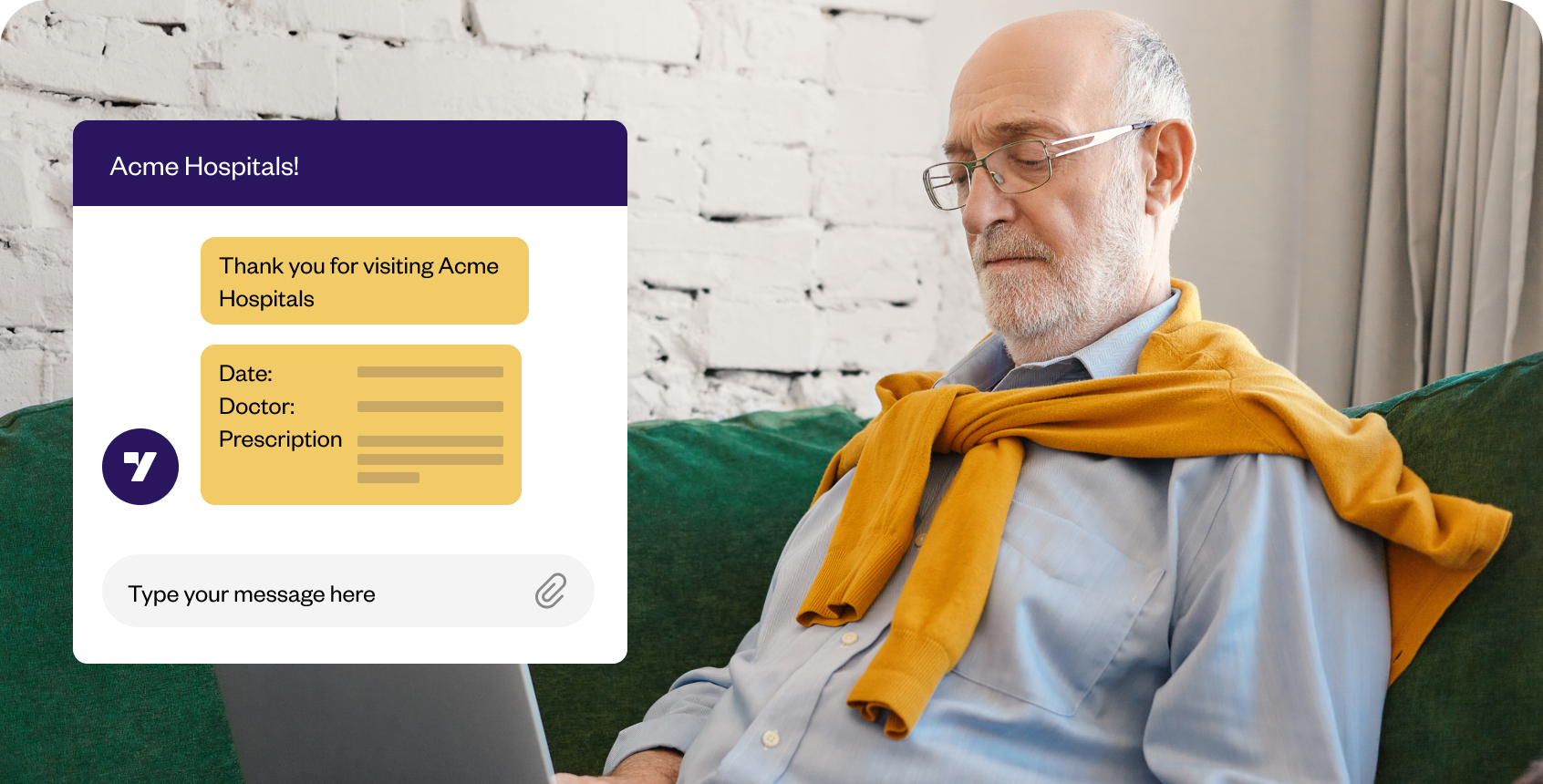Executive summary
The introduction of AI-driven healthcare chatbots marks a transformative era in the rapidly evolving world of healthcare technology. This article delves into the multifaceted role of healthcare chatbots, exploring their functionality, future scope, and the numerous benefits they offer to the healthcare sector. We will examine various use cases, including patient engagement, triage, data analysis, and telehealth support. Additionally, the article will highlight leading healthcare chatbots in the market and provide insights into building a healthcare chatbot using Yellow.ai’s platform.
Picture a world where healthcare support is accessible 24/7 at your fingertips, personalized and efficient. It is not a distant future scenario but the present reality, thanks to the advent of healthcare chatbots. These AI-powered virtual assistants are reshaping how healthcare providers interact with patients, manage data, and streamline operations. With an expected growth to USD 943.64 million by 2030, healthcare chatbots are not just a fleeting trend but a cornerstone in the future of healthcare delivery.
Healthcare chatbots, equipped with AI, Neuro-synthetic AI, and natural language processing (NLP), are revolutionizing patient care and administrative efficiency. From setting appointment reminders and facilitating document submission to providing round-the-clock patient support, these digital assistants are enhancing the healthcare experience for both providers and patients. As we dive into the world of healthcare chatbots, we will explore how they are not just fulfilling the demand for immediate, digital healthcare interactions but also significantly contributing to the improvement of the overall healthcare industry.
Related must-reads:
- Automation in healthcare: Transforming patient care at scale
- What is customer experience (CX) in healthcare?
- WhatsApp chatbots in healthcare: Their role and use cases
- 9 Real life chatbot examples [well-known brands]
- Top 17 benefits of chatbots for businesses and customers
What is a healthcare chatbot, and what does it do?
A healthcare chatbot is a sophisticated blend of artificial intelligence and healthcare expertise designed to transform patient care and administrative tasks. At its core, a healthcare chatbot is an AI-powered software application that interacts with users in real-time, either through text or voice communication. By employing advanced machine learning algorithms and natural language processing (NLP) capabilities, these chatbots can understand, process, and respond to patient inquiries with remarkable accuracy and efficiency.
The primary role of healthcare chatbots is to streamline communication between patients and healthcare providers. They serve as round-the-clock digital assistants, capable of handling a wide array of tasks – from answering common health queries and scheduling appointments to reminding patients about medication and providing tailored health advice. This constant availability not only enhances patient engagement but also significantly reduces the workload on healthcare professionals. By automating responses to repetitive questions and routine administrative tasks, healthcare chatbots free up valuable time for healthcare staff, allowing them to focus more on critical care and patient interaction.
Moreover, healthcare chatbots are being integrated with Electronic Health Records (EHRs), enabling seamless access to patient data across various healthcare systems. This integration fosters better patient care and engagement, as medical history and patient preferences are readily available to healthcare providers, ensuring more personalized and informed care. The growing demand for virtual healthcare, accelerated by the global pandemic, has further propelled the adoption of healthcare chatbots. These AI-driven platforms have become essential tools in the digital healthcare ecosystem, enabling patients to access a range of healthcare services online from the comfort of their homes.
Personalized healthcare is just a conversation away
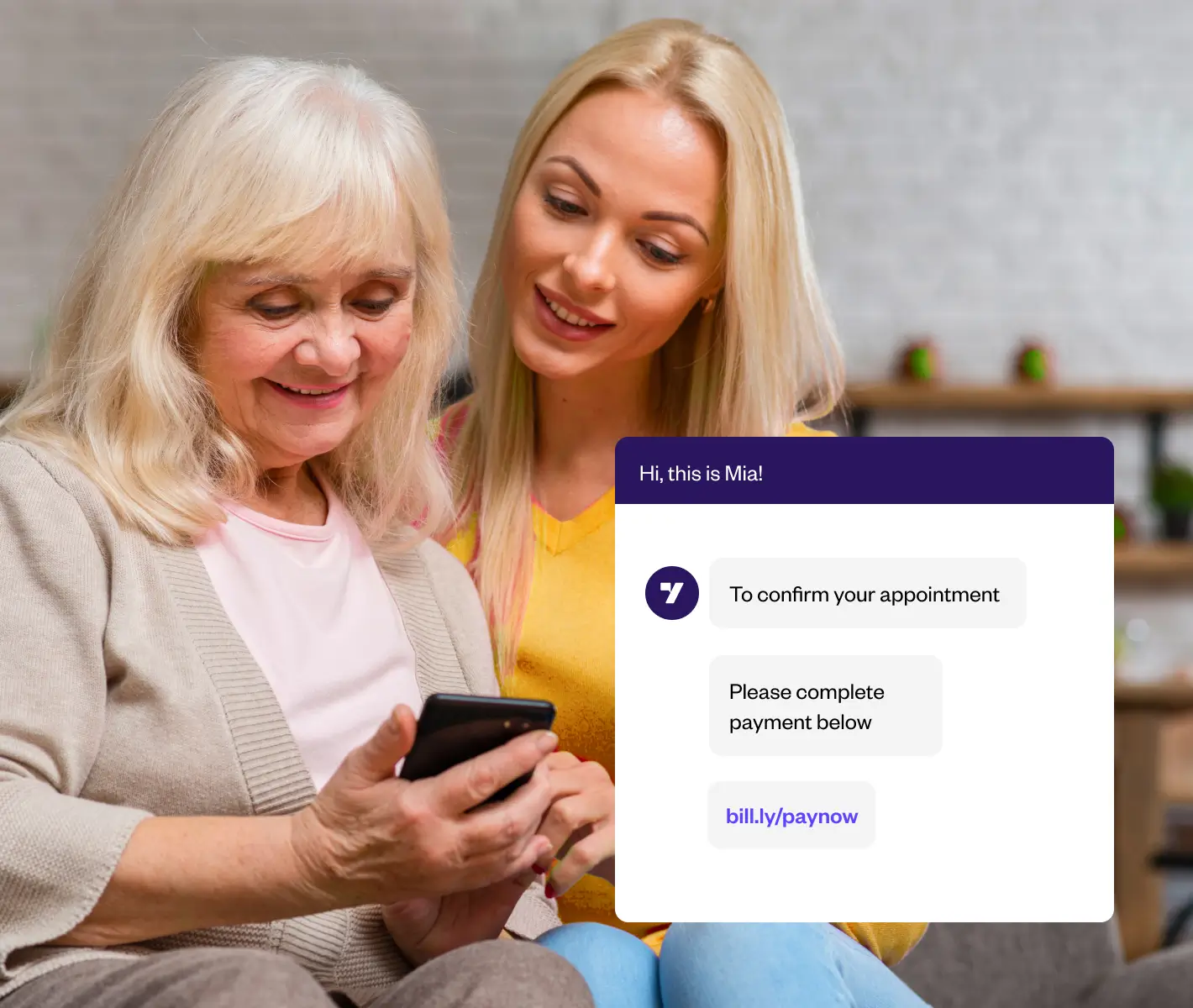
What is the future scope of chatbots in healthcare?
The healthcare industry is on the cusp of a significant transformation, with healthcare chatbots poised to play a pivotal role. The future of these AI-driven assistants is bright and multifaceted, set to revolutionize the way healthcare is delivered and experienced. Here’s a glimpse into what the future holds for healthcare chatbots:
Related read: Conversational AI in healthcare
Advanced medical assistance and monitoring:
In the near future, healthcare chatbots are expected to evolve into sophisticated companions for patients, offering real-time health monitoring and automatic aid during emergencies. Their capability to continuously track health status and promptly respond to critical situations will be a game-changer, especially for patients managing chronic illnesses or those in need of constant care.
Enhanced mental health and disorder management:
Chatbots will play a crucial role in managing mental health issues and behavioral disorders. With advancements in AI and NLP, these chatbots will provide empathetic support and effective management strategies, helping patients navigate complex mental health challenges with greater ease and discretion.
Proactive healthcare and early diagnosis:
The future of healthcare chatbots also lies in proactive care. They will be equipped to identify symptoms early, cross-reference them with patients’ medical histories, and recommend appropriate actions, significantly improving the success rates of treatments. This proactive approach will be particularly beneficial in diseases where early detection is vital to effective treatment.
What are the benefits of healthcare chatbots?
The integration of chatbots in healthcare is not just a technological advancement; it’s a paradigm shift in enhancing healthcare delivery and patient experience. Let’s delve into the significant benefits of healthcare chatbots:
1. Improved patient engagement
Healthcare chatbots revolutionize patient interaction by providing a platform for continuous and personalized communication. These digital assistants offer more than just information; they create an interactive environment where patients can actively participate in their healthcare journey.
For instance, chatbots can engage patients in their treatment plans, provide educational content, and encourage lifestyle changes, leading to better health outcomes. This interactive model fosters a deeper connection between patients and healthcare services, making patients feel more involved and valued.
2. 24/7 availability
The healthcare sector is no stranger to emergencies, and chatbots fill a critical gap by offering 24/7 support. Their ability to provide instant responses and guidance, especially during non-working hours, is invaluable. This constant availability means patients can receive immediate answers to urgent questions, guidance for minor health issues, or directions on when to seek emergency care, thereby reducing unnecessary hospital visits and easing the burden on healthcare systems.
3. Efficient triage
In healthcare, chatbots serve as efficient triage tools. By quickly assessing symptoms and medical history, they can prioritize patient cases and guide them to the appropriate level of care. This efficient sorting helps in managing patient flow, especially in busy clinics and hospitals, ensuring that critical cases get timely attention and resources are optimally utilized.
4. Data collection and analysis
Chatbots are not just communication tools; they are data powerhouses. As they interact with patients, they collect valuable health data, which can be analyzed to identify trends, optimize treatment plans, and even predict health risks. This continuous collection and analysis of data ensure that healthcare providers stay informed and make evidence-based decisions, leading to better patient care and outcomes.
5. Appointment scheduling
Appointment scheduling becomes a breeze with healthcare chatbots. Patients can easily book, reschedule, or cancel appointments through a simple, conversational interface. This convenience reduces the administrative load on healthcare staff and minimizes the likelihood of missed appointments, enhancing the efficiency of healthcare delivery.
6. Cost savings
Chatbots in healthcare contribute to significant cost savings by automating routine tasks and providing initial consultations. This automation reduces the need for staff to handle basic inquiries and administrative duties, allowing them to focus on more complex and critical tasks. In addition, by handling initial patient interactions, chatbots can reduce the number of unnecessary in-person visits, further saving costs.
7. Health education
One of the most impactful roles of healthcare chatbots is in health education. They provide personalized, easy-to-understand information about diseases, treatments, and preventive measures. This continuous education empowers patients to make informed health decisions, promotes preventive care, and encourages a proactive approach to health.
8. Medication management
Medication adherence is a crucial challenge in healthcare, and chatbots offer a practical solution. By sending timely reminders and tracking medication schedules, they ensure that patients follow their prescribed treatments effectively. This consistent medication management is particularly crucial for chronic disease management, where adherence to medication is essential for effective treatment.
9. Telehealth support
Chatbots are invaluable in the expanding field of telehealth. They provide preliminary assessments, answer general health queries, and facilitate virtual consultations. This support is especially important in remote areas or for patients who have difficulty accessing traditional healthcare services, making healthcare more inclusive and accessible.
10. Scalability
The scalability of healthcare chatbots is a significant advantage. They can handle a large volume of interactions simultaneously, ensuring that all patients receive timely assistance. This capability is crucial during health crises or peak times when healthcare systems are under immense pressure. The ability to scale up rapidly allows healthcare providers to maintain quality care even under challenging circumstances.
Use cases of healthcare chatbots
Healthcare chatbots have become indispensable in modern healthcare, addressing various aspects of patient care and administrative tasks. Let’s take a detailed look at their diverse use cases:
1. Providing symptom assessment and triage
Healthcare chatbots play a crucial role in initial symptom assessment and triage. They ask patients about their symptoms, analyze responses using AI algorithms, and suggest whether immediate medical attention is required or if home care is sufficient.
For instance, a healthcare chatbot uses AI to evaluate symptoms against a vast medical database, providing patients with potential diagnoses and advice on the next steps. It not only improves patient access to immediate health advice but also helps streamline emergency room visits by filtering non-critical cases.
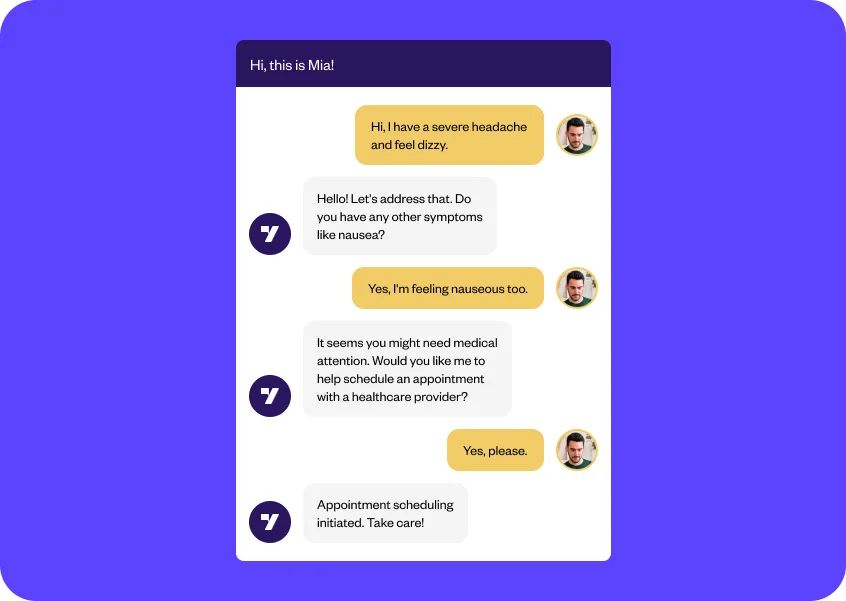
2. Scheduling appointments and reminders
Chatbots significantly simplify the process of scheduling medical appointments. Patients can interact with the chatbot to find the most convenient appointment times, thus reducing the administrative burden on hospital staff. AI chatbots remind patients of upcoming appointments and medication schedules. By ensuring that patients attend their appointments and adhere to their treatment plans, these reminders help enhance the effectiveness of healthcare.
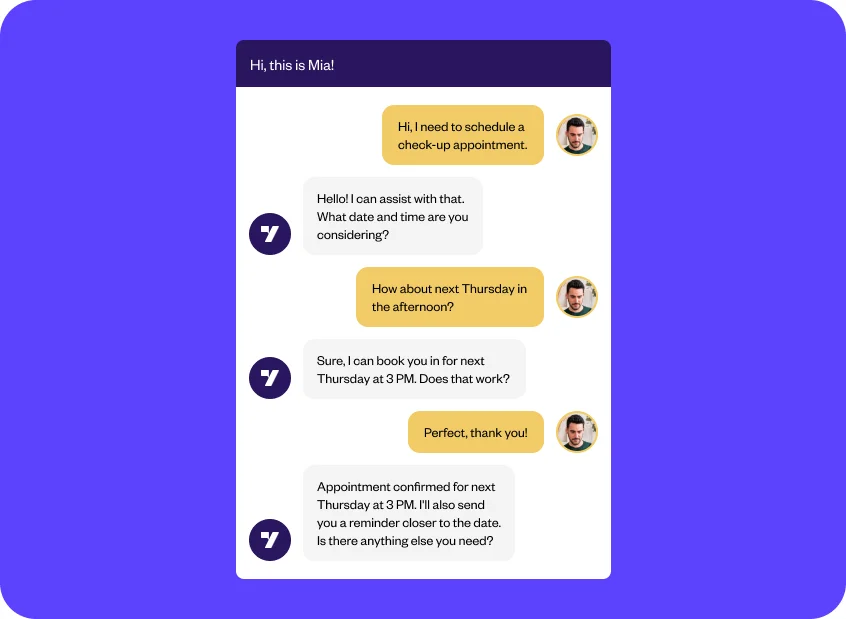
3. Answering patient questions
Acting as 24/7 virtual assistants, healthcare chatbots efficiently respond to patient inquiries. This immediate interaction is crucial, especially for answering general health queries or providing information about hospital services. A notable example is an AI chatbot, which offers reliable answers to common health questions, helping patients to make informed decisions about their health and treatment options.
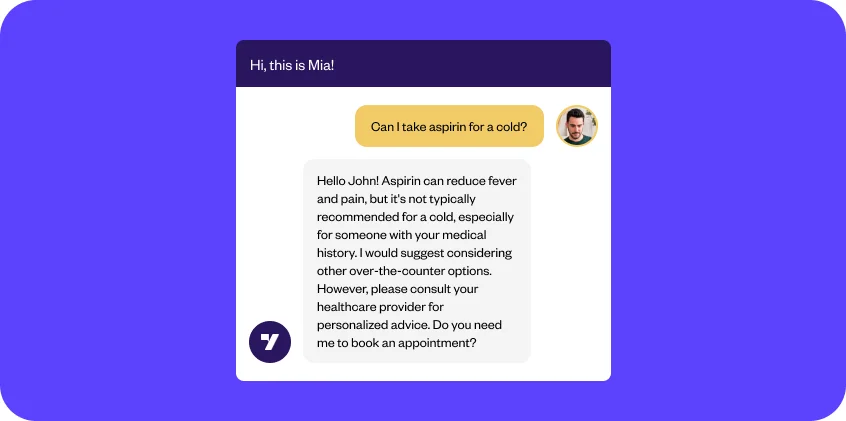
4. Collecting patient data
Chatbots streamline patient data collection by gathering essential information like medical history, current symptoms, and personal health data. This information is crucial for personalized patient care. For example, chatbots integrated with electronic health records (EHRs) can update patient profiles in real-time, ensuring that healthcare providers have the latest information for diagnosis and treatment.
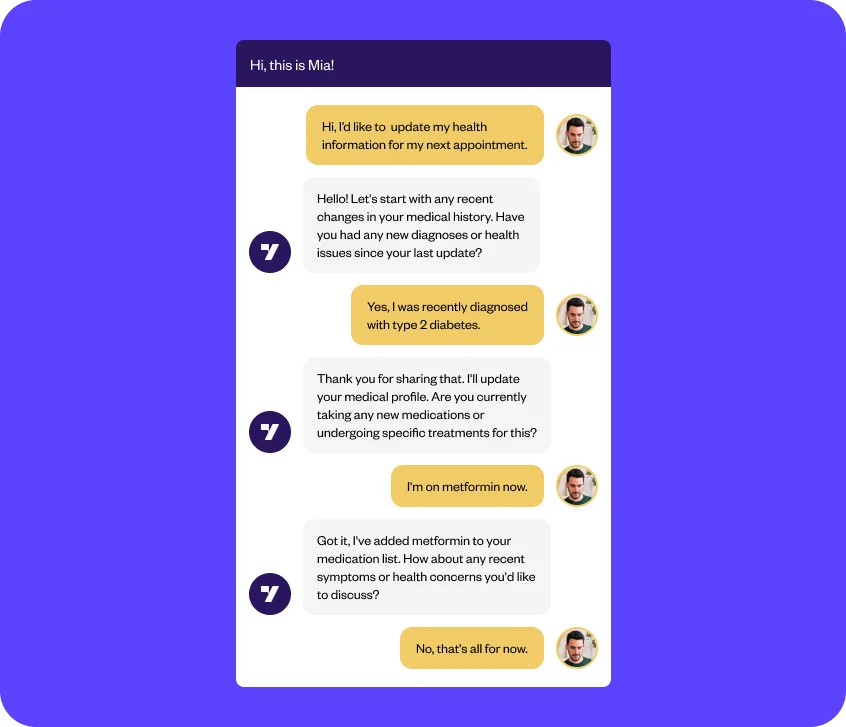
5. Providing mental health support
In the domain of mental health, chatbots like Woebot use CBT techniques to offer emotional support and mental health exercises. These chatbots engage users in therapeutic conversations, helping them cope with anxiety, depression, and stress. The accessibility and anonymity of these chatbots make them a valuable tool for individuals hesitant to seek traditional therapy.
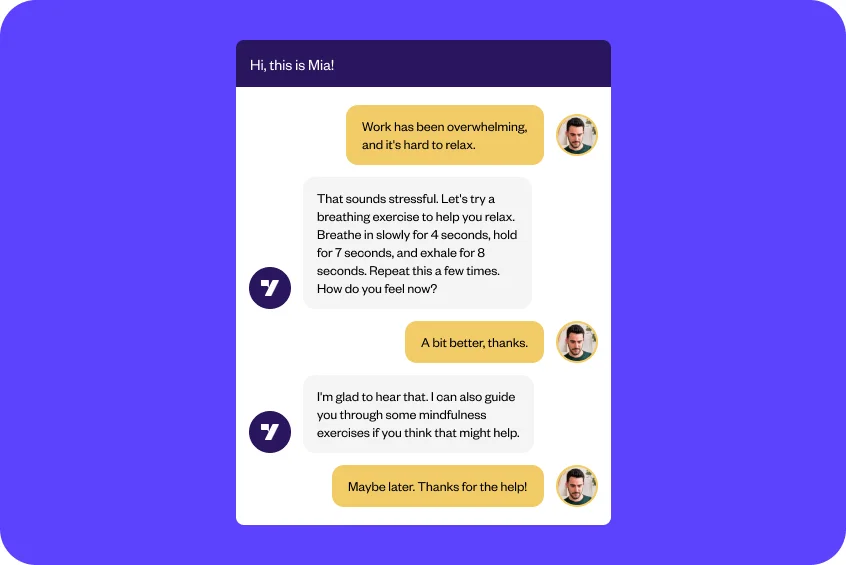
6. Managing insurance queries
Healthcare chatbots assist patients in navigating insurance queries and procedures. They provide information on coverage, help in claim filing, and track claim status. For instance, chatbots in insurance portals can answer FAQs about policies, guide patients through the claims process, and provide real-time updates on claim status, simplifying the insurance management process.
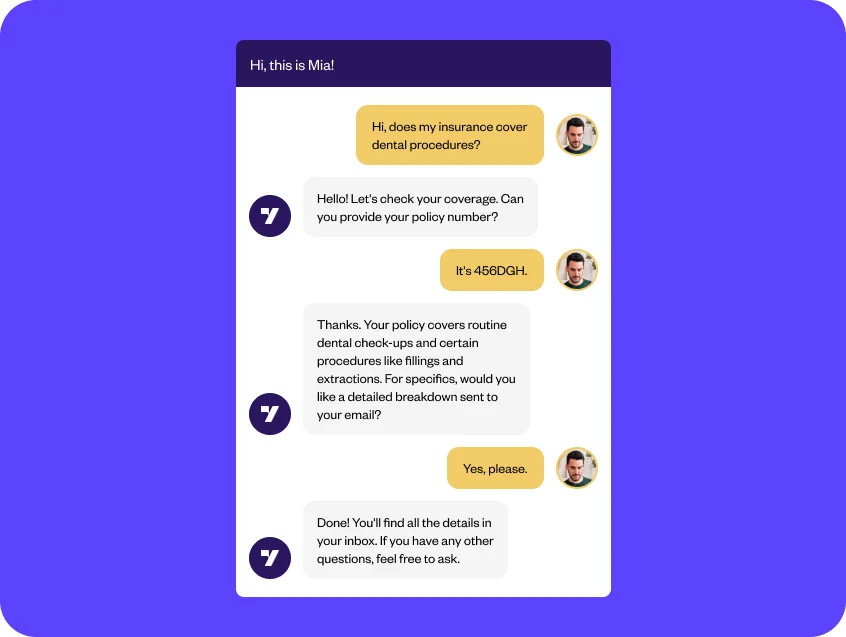
7. Facilitating telemedicine
Chatbots are integral in telemedicine, serving as the first point of contact. They collect preliminary information, schedule virtual appointments, and facilitate doctor-patient communication. An example is a telehealth platform where a chatbot pre-screens patients, collects their symptoms and history, and schedules a video consultation with the relevant specialist, making telemedicine more streamlined and accessible.
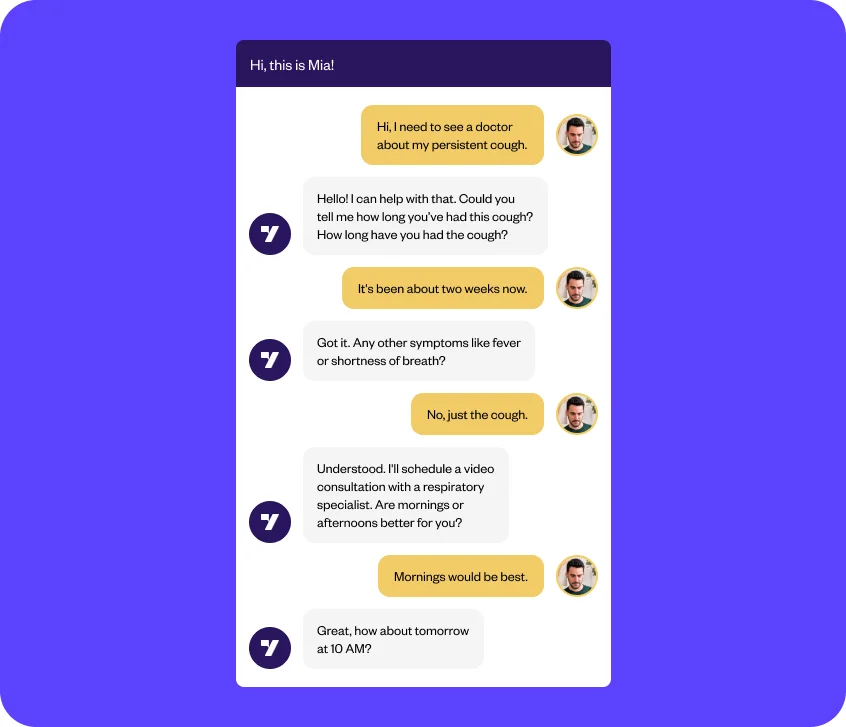
8. Facilitating post-care follow-ups
Post-treatment, chatbots engage in follow-up care. They send queries about patient well-being, collect feedback on treatments, and provide post-care instructions. This continuous engagement ensures effective recovery monitoring. For example, a chatbot might check on a patient’s recovery progress after surgery, reminding them of wound care practices or follow-up appointments, thereby extending the care continuum beyond the hospital.
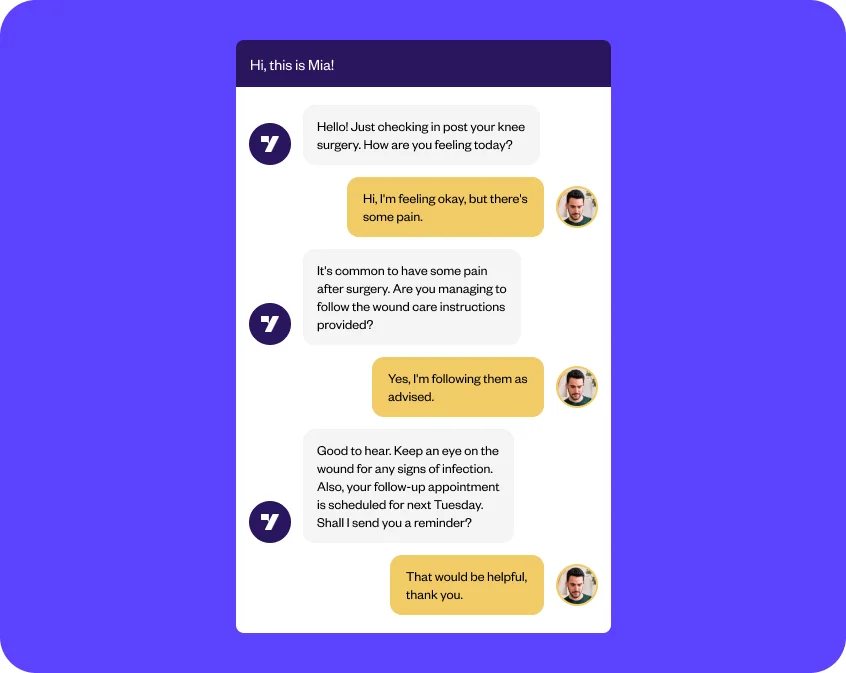
Each of these use cases demonstrates the versatility and effectiveness of healthcare chatbots in enhancing patient care, streamlining operations, and improving overall healthcare delivery.
How to build a healthcare chatbot from the Yellow.ai platform?
Transforming healthcare communication and management with AI-driven solutions, Yellow.ai stands at the forefront, offering advanced platforms for creating personalized healthcare chatbots. Yellow.ai’s platform empowers healthcare providers to design chatbots tailored to their specific needs, ensuring efficient patient interaction and streamlined operations. Here’s how Yellow.ai can help you create an impactful healthcare chatbot:
Easy integration: Yellow.ai’s platform seamlessly integrates with existing healthcare systems, including Electronic Health Records (EHRs), appointment scheduling systems, and patient management tools. This integration ensures that the chatbot is a natural extension of your healthcare services. Read more
Advanced AI and NLP capabilities: Leveraging cutting-edge AI and natural language processing technologies, Yellow.ai enables the creation of chatbots that understand and respond to complex patient queries with precision, making interactions natural and effective.
Customizable templates: With a range of customizable templates, healthcare providers can quickly design chatbots that align with their specific requirements, whether it’s for patient triage, appointment scheduling, or health education.
Data security and compliance: Understanding the critical importance of data privacy in healthcare, Yellow.ai ensures that its platform adheres to stringent security protocols and compliance standards, including HIPAA compliance and safeguarding sensitive patient information.
Scalability and reliability: The platform is designed to handle high volumes of interactions, ensuring that the chatbot can scale up as needed, especially during peak times or health crises, without compromising on performance or reliability.
24/7 support and analytics: With continuous support and robust analytics, Yellow.ai helps healthcare providers monitor chatbot performance, gather insights, and make data-driven decisions to enhance patient care and chatbot functionality.
To discover how Yellow.ai can revolutionize your healthcare services with a bespoke chatbot, book a demo today and take the first step towards an AI-powered healthcare future.
A new era in healthcare: Embracing AI for enhanced care
As we navigate the evolving landscape of healthcare, the integration of AI-driven chatbots marks a significant leap forward. These digital assistants are not just tools; they represent a new paradigm in patient care and healthcare management. Embracing this technology means stepping into a future where healthcare is more accessible, personalized, and efficient. The journey with healthcare chatbots is just beginning, and the possibilities are as vast as they are promising. As AI continues to advance, we can anticipate an even more integrated and intuitive healthcare experience, fundamentally changing how we think about patient care and healthcare delivery.
Healthcare chatbot – Frequently asked questions (FAQs)
How are chatbots helping doctors?
Chatbots assist doctors by automating routine tasks, such as appointment scheduling and patient inquiries, freeing up their time for more complex medical cases. They also provide doctors with quick access to patient data and history, enabling more informed and efficient decision-making.
What is an example of a healthcare chatbot?
An example of a healthcare chatbot is Babylon Health, which offers AI-based medical consultations and live video sessions with doctors, enhancing patient access to healthcare services.
How are AI chatbots used in healthcare?
AI chatbots in healthcare are used for various purposes, including symptom assessment, patient triage, health education, medication management, and supporting telehealth services. They streamline patient-provider communication and improve healthcare delivery.
How to make a healthcare chatbot?
To create a healthcare chatbot, you can use platforms like Yellow.ai, which provide tools for building AI-powered chatbots with customizable features, integration capabilities, and compliance with healthcare regulations.
Is there a mental health chatbot?
Yes, there are mental health chatbots like Youper and Woebot, which use AI and psychological techniques to provide emotional support and therapeutic exercises, helping users manage mental health challenges.












